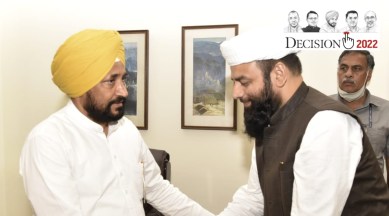Punjab polls: 2% of numbers, 1 in 117 MLAs, Muslims seek a voice
With seats likely to be decided in Punjab on very thin margins this time, given the number of parties in the fray, the Muslim community that makes up nearly 2% of the population in the state as per the 2011 Census (numbering around 6 lakh) is also hoping to be counted.

Recently, the Ludhiana Jama Masjid held a ‘Muslim panchayat’, where different organisations came together to thrash out a memorandum for political parties ahead of their manifesto announcements.
With seats likely to be decided in Punjab on very thin margins this time, given the number of parties in the fray, the Muslim community that makes up nearly 2% of the population in the state as per the 2011 Census (numbering around 6 lakh) is also hoping to be counted.
At the panchayat meeting, the participants asked why speeches about the Muslim community were limited to promises of land for kabristan (graveyards), and spoke about how all parties neglected them. For years now, there has been only one Muslim MLA in the Assembly.
Shahi Imam Maulana Usman Ludhianvi, the national president of the Majlis-e-Ahrar Islam Hind Party, who organised the meeting, said: “In more than two dozen constituencies, the Muslim vote is 10,000-plus. With a five-cornered contest this time, we should not be ignored as a vote bank.”
Hans Raj Mofar, the president of the Muslim Front Punjab, said they had been raising issues related to the community since 1999. “But talk is only of graveyards, and it remains only talk. Most graveyards don’t even have a boundary wall and hence encroachment is increasing. The Waqf Board is just an administrative board while very little representation is given to Muslim leaders in Punjab, especially those who are Punjabi by origin. The few Muslim families which are active in Punjab have migrated from UP or other states.”
One of the most prominent Muslim politicians in Punjab is Razia Sultana, the Congress candidate from Punjab’s only Muslim-dominated constituency Malerkotla, with around 95,000 members from the community. The real power in the family rests with her husband, retired DGP Mohd Mustafa, who is originally from UP. Malerkotla is the only constituency with a Muslim representative in the Assembly.
Maulana Ludhianvi listed other seats where Muslims are in large numbers, besides Malerkotla, such as Amargarh, Sujanpur, Ludhiana North, East, South, Lehragaga, Amloh and Mohali. “We deserve tickets from at least five-six Assembly seats. Only then will we be able to raise issues of our community in the Vidhan Sabha,” he said.
Mohd Mustkeem, the media secretary of the Shahi Imam, added: “Muslims are spread out across the state but political parties project as if only Malerkotla (matters)… Only one Muslim MLA is not enough to represent our community.”
Saif Ahmed, who is affiliated with the Congress as chairman of its minorities cell in Fatehgarh Sahib district, said “I need to think about my community”. Urging parties to consider this while making their manifestos, Ahmed said it was not a surprise that a recent controversy involving a speech given by Mustafa in Malerkotla had not blown up. “I am thankful that Punjab’s Hindus, Muslims, Sikhs kept their cool. This is the speciality of Punjab, where all communities live in peace. All we need are more opportunities and basic facilities.”
Booked on the charge of “promoting enmity between groups” for his January 20 speech, Mustafa has so far not applied for bail. Nor have police tried to take him into custody.
Waseem Sheikh, secretary, Muslim Sikh Federation of Punjab, said most Muslim organisations in the state strongly objected to Mustafa’s speech. Urging that the row not be made communal, he said: “Political parties should think about issues other than this, and Muslim voters should also vote judiciously for a person who talks of development.” Mohd Saleem, a Mohali-based advocate who attended the Ludhiana panchayat, said they expect the Muslims to be more widespread in the state than suggested by the 2011 Census, as many had not registered at the time.
Among the demands raised at the Muslim panchayat were an Islamia High School in every district; increase in salaries of imams paid by the Waqf Board, from around Rs 8,000 per month to Rs 10,000; a hike in the annual grant of the board to Rs 100 crore; reservation for land for graveyards, with boundary walls; a Muslim community centre in every district; and a madrasa board on the lines of UP and Bihar. Apart from this, the panchayat also called for a Gujjar development board and representation for Muslims in municipal corporation polls.
Akali Dal spokesperson Daljeet Singh Cheema said, “We always take care of minorities, as we too represent a minority community (Sikhs). It is true that our party has been giving tickets to Muslims in only Malerkotla, and that there are several other seats where Muslim voters are in a significant number, but we do believe in giving representation to all communities at various levels. Our government had formed a grievances committee as well in which every minority community in Punjab was represented.”
Punjab Congress spokesperson Rimple Midham also asserted that the party was committed towards all communities. “Let the latest Census figures come out, and we will know the exact population of Muslims in the state… There are many senior Muslim leaders in our party and the Muslim community can always send their representations through them.”